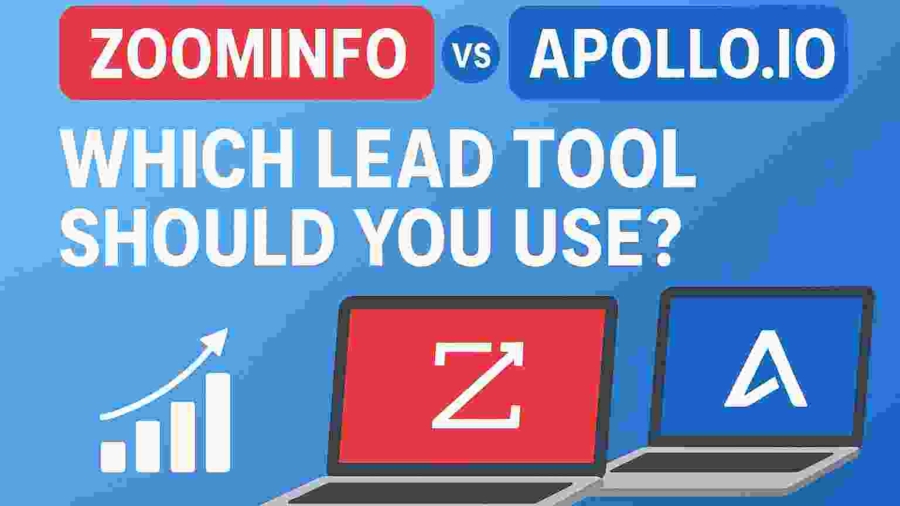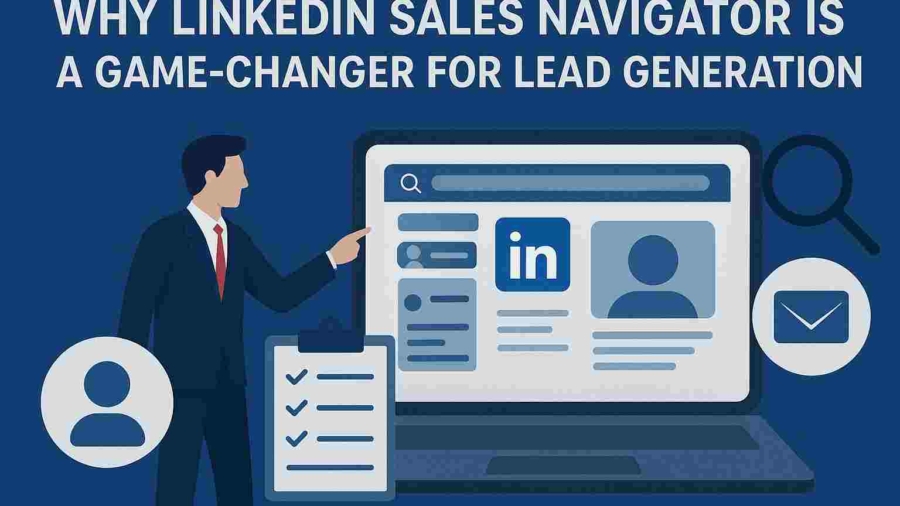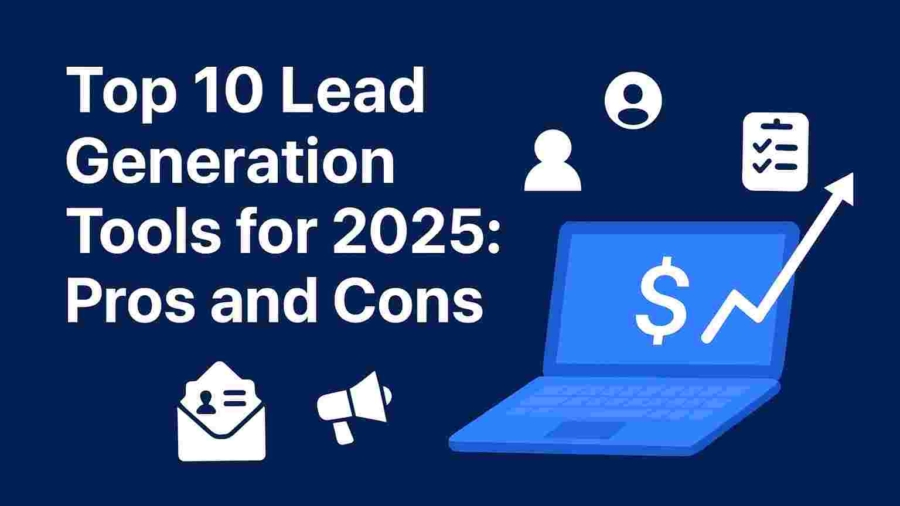Introduction
Every business wants one thing—high-quality leads. Whether you’re a startup founder or part of an enterprise sales team, having the right data can make or break your pipeline. This is where tools like ZoomInfo and Apollo.io come into play. Both platforms promise accurate B2B contacts, automation, and integrations, but the real question is: Which one should you use?
Let’s dive into a side-by-side comparison to help you decide which tool fits your sales strategy.
What is ZoomInfo?
ZoomInfo is one of the most well-known B2B data intelligence platforms, widely used by enterprises and Fortune 500 companies.
Key features include:
- Access to millions of verified B2B contacts
- Company insights and firmographics
- Intent data (helps you know when a company is ready to buy)
- CRM integrations with HubSpot, Salesforce, and more
- Advanced filtering and segmentation
Who should use ZoomInfo?
Large organizations that need deep insights, verified data, and advanced analytics. If budget isn’t an issue and precision matters, ZoomInfo shines.
What is Apollo.io?
Apollo.io is a lead generation and sales engagement platform that offers data plus built-in outreach features. Unlike ZoomInfo, Apollo is more affordable and startup-friendly.
Key features include:
- Over 275M+ contacts in its database
- Built-in email sequencing and LinkedIn automation
- Chrome extension for easy prospecting
- CRM integrations
- AI-based lead scoring
Who should use Apollo.io?
Startups, small businesses, and sales teams looking for data + automation in one platform without breaking the bank.
ZoomInfo vs Apollo.io: Quick Comparison
| Feature | ZoomInfo | Apollo.io |
|---|---|---|
| Pricing | $$$$ (expensive) | $ (affordable) |
| Database Size | 200M+ contacts | 275M+ contacts |
| Data Accuracy | Very high, verified | Good, improving |
| Ease of Use | Enterprise-level, complex | Beginner-friendly |
| Integrations | Strong CRM/marketing | Wide CRM + outreach |
| Automation | Limited | Advanced outreach |
Database Quality & Accuracy
- ZoomInfo: Known for highly verified, accurate data. They use multiple sources including AI, machine learning, and manual verification.
- Apollo.io: Offers a large database, but accuracy isn’t always on par with ZoomInfo. Some users report bounced emails.
👉 Verdict: If accuracy matters most, ZoomInfo wins. If you’re okay with some manual cleaning, Apollo is solid.
Pricing & Affordability
- ZoomInfo: Pricing is not transparent but typically $10,000+ per year. Best for enterprises.
- Apollo.io: Offers a free plan and paid plans starting around $49/month.
👉 Verdict: For startups, Apollo.io is unbeatable. For enterprises with large budgets, ZoomInfo is worth it.
Ease of Use & User Experience
- ZoomInfo: More complex, requires training. Built for enterprise sales teams.
- Apollo.io: Intuitive, with a smooth dashboard and easy onboarding.
👉 Verdict: If you’re new to lead gen, Apollo is easier.
Integrations & CRM Compatibility
- ZoomInfo: Seamless integrations with Salesforce, HubSpot, Marketo, Outreach, and more.
- Apollo.io: Works well with CRMs like Salesforce, HubSpot, and also includes native email and LinkedIn automation.
👉 Verdict: Both are good, but Apollo adds automation on top.
Sales Automation Features
- ZoomInfo: Focuses mainly on data. Outreach automation is limited.
- Apollo.io: Has built-in email sequencing, LinkedIn automation, and AI-based recommendations.
👉 Verdict: Apollo.io wins if you want data + engagement in one place.
Customer Support & Community
- ZoomInfo: Offers dedicated account managers, priority support for enterprises.
- Apollo.io: Has solid support, active community, and fast responses.
👉 Verdict: Both are reliable, but ZoomInfo feels more enterprise-level.
Pros and Cons of ZoomInfo
Pros:
- Extremely accurate data
- Enterprise-grade features
- Intent data for advanced targeting
Cons:
- Very expensive
- Complex to use for beginners
Pros and Cons of Apollo.io
Pros:
- Affordable and startup-friendly
- Data + outreach in one platform
- Easy to use with built-in automation
Cons:
- Data accuracy can vary
- Less advanced analytics compared to ZoomInfo
Best Use Cases for ZoomInfo
- Enterprise sales teams
- Companies needing highly accurate, verified data
- Businesses with large budgets for data tools
Best Use Cases for Apollo.io
- Startups and SMBs
- Sales teams on a budget
- Teams that need automation + prospecting in one platform
ZoomInfo vs Apollo.io: Final Verdict
If you’re an enterprise with a big budget and accuracy is critical, ZoomInfo is the clear winner. But if you’re a startup or small business looking for a budget-friendly tool that also handles outreach, Apollo.io is the smarter choice.
👉 Still confused? Visit ZoomInfo List for expert insights on choosing the right tool.
Conclusion
Both ZoomInfo and Apollo.io are powerful lead generation platforms—but they serve different audiences. ZoomInfo is built for big enterprises needing accuracy, while Apollo.io empowers startups with affordable automation. The right choice depends on your budget, team size, and goals.
FAQs
1. Is ZoomInfo better than Apollo.io for B2B?
Yes, for enterprises. ZoomInfo offers more accurate and verified data, making it ideal for large B2B teams.
2. Can Apollo.io replace ZoomInfo?
For startups, yes. Apollo.io provides enough data and automation to cover most needs.
3. Which is more affordable?
Apollo.io is much more affordable, with free and low-cost plans.
4. Do both tools offer free trials?
Apollo.io offers a free plan. ZoomInfo usually provides demos, but not a standard free trial.
5. Which one is best for startups?
Apollo.io is the better choice for startups due to its affordability and automation.



